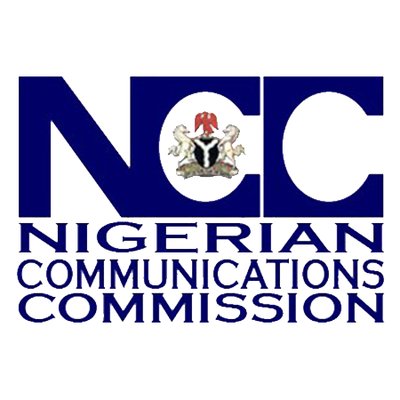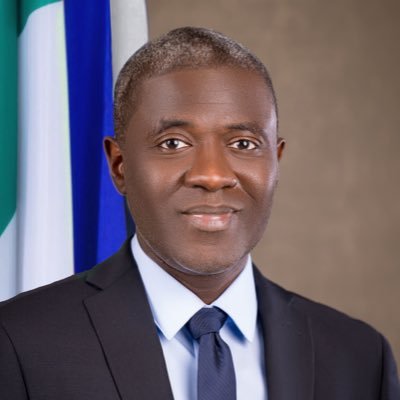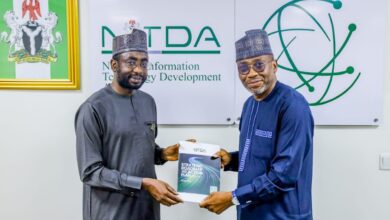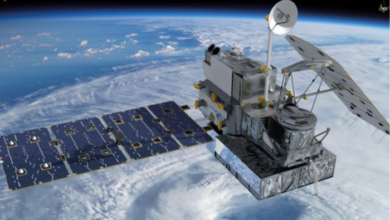NCC, Stakeholders Brainstorm On Assistive Technology To Aid People With Disabilities

The Nigerian Communications Commission (NCC), and Telecom industry Stakeholders in a webinar conference, brainstorm on ways to leverage technology in enhancing businesses, security and to aid the physically challenged persons.
IDEA ’04 defines an assistive technology service as “any service that directly assists a child with a disability in the selection, acquisition, or use of an assistive technology device.”
The Executive Vice Chairman/CEO of NCC, Prof. Umar Danbatta in his welcome address, stressed the need to assist both the physically challenged and security agencies on the use of assistive technology.
Represented by the Director, New Media and Information Security, NCC, Dr. Haru Alhassan, Danbatta said, AT was necessary to address unmet needs.
He said, “taking into cognisance that both accessibility and usability could differ for individual depending on physical abilities just as it can differ for sectors-specific transactions, we search for assistance. For the physically challenged, assistance is not only needed but required to be given. Sometimes also, in national interest assistance is required especially with new media – e.g. in surveillance, immigration, policing, trade and so on. In order to address these unmet needs we turn to Assistive Technology (AT) through universal design in all forms of telecommunications services design.”
According to him, “a major requirement of a utility regulator like the NCC is to be in continual fulfillment of its universal access and service obligations (UASO). Achieving this mandate involves paying due attention to new media development and in particular on the approaches to availability, accessibility and usability. Notwithstanding the underlining design or manufacturing philosophy adopted, it is very important to meet this wide variety of needs in the original design of telecommunications systems, so that an increasing number of users can benefit from available services,” he said.
The EVC said, “Assistive Technology function is an addition and novel regulatory approach towards fulfilling the universal access and service obligation. Besides, AT is in compliance with the recommendations of the International Telecommunication Union (ITU) through Study Group-16 which Working Parties (WPs) deal with Multimedia. Through its different WPs, SG-16 develops capability to handle different information media and control actions which varies within wide boundaries amongst users of telecommunications and multimedia services .”
In Nigeria, a lot of success has been achieved opening up the telecommunications space and it is timely to advance attention on design for all (DfA) or universal design (UD) which can lead to offering of devices that are accessible and usable in totality. This consideration will, however, highlight some inherent technical and social implications for which only regulatory and legislative interventions can resolve. In addition, it will support several new thematic actions to be established in the national context.
The objectives of the conference are:
To ensure co-ordination of telecoms related services or products with the design-for-all and Assistive technology fields, promote the role of NCC as a focal candidate in the design-for-all Assistive Technology, promote local content contributions and expand knowledge acquisition in developing future guidelines and tools by sector players, assist in organising promotional activities on design-for-all and assistive technology guidelines and recommendations others are to promote inclusiveness in New Media user-group through workshops and others collaborative opportunities, increase accessibility of New Media telecommunications network services and equipments by the needy community through design or alternatively, by adaptation when necessary and increase usability and accessibility of telecommunications services and development of corresponding toolsets and others.
The conference focused on four key areas, which are: provision of Assistive Technologies in the field of communications, with a view to the identification of unmet needs, identification of recent technological developments that may enable new services, identification of existing Assistive Technology developments, including those that may require immediate intervention by relevant parties and to achieve a set of priority areas where NCC’s involvement could provide the stimulus for industry to develop new assistive products or services. And to also provide context awareness on Assistive Technology (AT), which is assistive, adaptive, and rehabilitative devices for physically challenged people, as well as things of national interest like surveillance, policing and so on.
Earlier, in his remarks, the Director, New Media and Information Security, NCC, Dr. Haru Alhassan said, “the conference aims at ensuring that available resources are targeted effectively to identify the areas where NCC could have the greatest potential impact in supporting the future development and application of new Assistive Technology by way of design for all (DfA) or universal design (UD).
We encourage you all to participate fully in this workshop,” he said.
Eniola Campbell, Nokia country head in Nigeria said, “5G technology will greatly impact on Internet of Things devices as it will enable us do a lot with them without being present everywhere.”
Felix Gbadebo, a retired Air Vice Marshall said, with AT, telecom could assist the physically challenged in the society.






